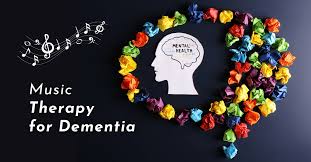Music has long been celebrated for its ability to evoke emotion, spark memories, and uplift the human spirit. In recent years, its therapeutic power has found a crucial role in healthcare, particularly for individuals living with dementia. Music for Dementia has emerged as an innovative and compassionate approach to improving quality of life, enhancing cognitive function, and reducing behavioral symptoms in patients.
This article explores the benefits of music therapy, scientific insights, practical applications, and strategies for integrating music into the daily lives of those affected by dementia.
Understanding Dementia
Dementia is a collective term for progressive cognitive disorders that affect memory, thinking, and behavior. Alzheimer’s disease is the most common form, but dementia can also result from vascular conditions, Lewy body disease, and other neurological disorders.
Symptoms of dementia include:
- Memory loss and confusion
- Difficulty communicating or understanding language
- Mood swings, anxiety, and depression
- Restlessness or agitation
Traditional treatments focus on medication and cognitive therapies, but these often provide limited relief. Non-pharmacological approaches, like music therapy, offer complementary methods to support well-being.
What Is Music Therapy for Dementia?
Music for Dementia refers to the structured use of music to stimulate cognitive, emotional, and social functions in individuals with dementia. This can include:
- Listening to familiar songs or playlists
- Singing or humming along
- Playing instruments
- Participating in group music sessions
The therapy works by activating parts of the brain responsible for memory, emotion, and sensory processing. Music can trigger long-term memories even when short-term memory is severely impaired.
Benefits of Music for Dementia
1. Enhancing Memory Recall
Music has a unique ability to evoke memories from the past. Familiar songs can help dementia patients recall important personal events, names, or relationships. This phenomenon is known as the “reminiscence effect,” and it provides comfort and cognitive stimulation.
2. Reducing Agitation and Anxiety
Many individuals with dementia experience agitation, aggression, or anxiety. Studies show that calming music can lower stress hormones, reduce heart rate, and promote relaxation. Music for dementia, especially slow-tempo or classical pieces, creates a soothing environment.
3. Improving Mood and Emotional Expression
Music allows individuals to express emotions when verbal communication becomes challenging. Singing, clapping, or even moving to rhythms can foster joy, laughter, and emotional connection.
4. Encouraging Social Interaction
Group music sessions encourage social engagement, which is crucial for emotional health. Singing, dancing, or participating in music activities can reduce feelings of isolation and improve interpersonal connections.
5. Supporting Cognitive Function
Music stimulates multiple areas of the brain, including those involved in attention, language, and motor coordination. Regular exposure to music therapy can help maintain cognitive function and delay the progression of certain symptoms.
6. Enhancing Physical Activity
Rhythm and movement-based music therapy can improve motor skills, balance, and coordination. Simple activities such as clapping, tapping, or dancing enhance physical well-being and reduce the risk of falls.
Scientific Evidence Supporting Music Therapy
Research increasingly validates the benefits of music for dementia. Key findings include:
- A 2017 study published in Frontiers in Psychology found that personalized music playlists reduced agitation and improved mood in dementia patients.
- Research from the University of Miami demonstrated that group music therapy can enhance cognitive function and social engagement in long-term care residents.
- Functional MRI scans show that music activates regions of the brain unaffected by dementia, allowing for memory recall and emotional stimulation.
These studies highlight music therapy as a non-invasive, low-risk approach that complements traditional medical treatments.
Types of Music Used in Dementia Therapy
1. Personalized Playlists
Tailoring music to an individual’s preferences, cultural background, or meaningful memories enhances emotional resonance. Personalized playlists can include childhood songs, favorite artists, or religious music.
2. Classical and Instrumental Music
Slow-tempo classical music or instrumental pieces are often used to reduce agitation and promote relaxation. They can also aid in creating a calm environment in care facilities.
3. Group Singing and Choirs
Participating in choir groups or sing-alongs encourages social engagement, cognitive stimulation, and emotional expression. Group music fosters a sense of community among patients.
4. Rhythm and Movement
Music with a clear rhythm encourages physical activity, helping dementia patients maintain mobility, coordination, and balance.
Practical Applications for Caregivers and Families
1. Create Daily Music Routines
Incorporate music sessions into daily routines to provide consistency and reduce anxiety. Morning music can energize, while calming melodies in the evening promote relaxation.
2. Use Headphones or Speakers
Headphones help individuals focus on music without external distractions. In group settings, speakers can enhance shared experiences.
3. Encourage Participation
Invite dementia patients to sing, clap, or play simple instruments. Participation enhances cognitive stimulation and emotional engagement.
4. Observe Reactions
Pay attention to responses. Music may trigger positive memories, but certain songs could evoke sadness or discomfort. Adjust playlists accordingly.
5. Integrate with Other Therapies
Combine music therapy with art therapy, reminiscence therapy, or physical exercise for a holistic approach to dementia care.
Challenges in Using Music Therapy

While music for dementia offers many benefits, caregivers may face challenges:
- Selecting appropriate music for diverse tastes and backgrounds
- Limited access to professional music therapists
- Resistance from patients with severe cognitive impairment
- Managing disruptive behaviors during group sessions
With patience, observation, and personalized approaches, these challenges can be mitigated effectively.
Technology and Music for Dementia
Digital tools and apps have revolutionized access to music therapy:
- Streaming Platforms: Services like Spotify or YouTube allow caregivers to create personalized playlists.
- Music Therapy Apps: Apps designed for dementia provide structured exercises, interactive music games, and guided sessions.
- Smart Speakers: Voice-activated devices offer hands-free music access, making it easier for patients to enjoy familiar songs.
Technology ensures music therapy can reach patients at home, in care facilities, or in hospitals with minimal effort.
Conclusion
Music for Dementia is more than just entertainment; it is a therapeutic tool that enhances memory, reduces anxiety, encourages social interaction, and improves overall quality of life. By incorporating personalized playlists, group sessions, and rhythm-based activities, caregivers and families can harness the healing power of music to support cognitive, emotional, and physical well-being.
As research continues to validate its benefits, music therapy will remain a cornerstone of compassionate and effective dementia care, providing hope, joy, and connection for those living with this challenging condition.





